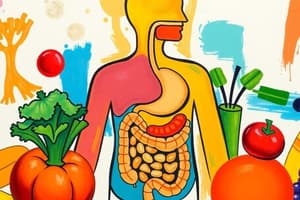Podcast
Questions and Answers
What is the primary role of carbohydrates in our diet?
What is the primary role of carbohydrates in our diet?
- To build muscle tissue
- To flush out toxins
- To regulate body temperature
- To provide energy (correct)
Which of the following is a deficiency disease caused by a lack of Vitamin C?
Which of the following is a deficiency disease caused by a lack of Vitamin C?
- Kwashiorkor
- Beri-beri
- Scurvy (correct)
- Anemia
What component in a balanced diet helps to prevent constipation?
What component in a balanced diet helps to prevent constipation?
- Vitamins
- Fibre (correct)
- Proteins
- Carbohydrates
The Body Mass Index (BMI) is a ratio of which two measurements?
The Body Mass Index (BMI) is a ratio of which two measurements?
Which of the following is NOT a role of proteins in the body?
Which of the following is NOT a role of proteins in the body?
Which item in a joint structure helps lubricate the joint?
Which item in a joint structure helps lubricate the joint?
What is a significant consequence of high sugar intake?
What is a significant consequence of high sugar intake?
What is the primary function of ligaments in the human skeleton?
What is the primary function of ligaments in the human skeleton?
Flashcards
What are carbohydrates?
What are carbohydrates?
A nutrient that provides energy, made of starch and simple sugars. Examples include rice and bread.
What are fats (Lipids)?
What are fats (Lipids)?
A nutrient that provides the most energy for the body. It's made of glycerol and fatty acids and stored as glycogen.
What are proteins?
What are proteins?
A nutrient made of amino acids. Examples include fish, meat, and eggs. They help build, replace, and repair tissues.
What is water?
What is water?
Signup and view all the flashcards
What is fibre?
What is fibre?
Signup and view all the flashcards
What are vitamins?
What are vitamins?
Signup and view all the flashcards
What are minerals?
What are minerals?
Signup and view all the flashcards
What is a balanced diet?
What is a balanced diet?
Signup and view all the flashcards
Study Notes
Lifestyle and Health
- Food Classes: Seven food groups: carbohydrates, fats, proteins, water, vitamins, minerals, and fiber. Each provides a specific function for the body.
- Carbohydrates: Provide energy (e.g., rice, bread).
- Fats (Lipids): Provide most energy, made of glycerol and fatty acids, stored as glycogen. (e.g., butter, cooking oil).
- Proteins: Made of amino acids, build and repair tissues (e.g., fish, meat, eggs).
- Water: Regulates body temperature, absorbs nutrients, flushes out waste, and repairs tissues.
- Vitamins: Necessary for health (e.g., fruits).
- Minerals: Build different substances in the body (e.g., calcium, sodium, iron).
- Fiber: Prevents constipation (e.g, vegetables, fruits).
Digestion
- Digestion breaks down large insoluble food molecules into small soluble molecules.
Measuring Energy
- Calorimetry measures energy by burning food in a controlled environment. The temperature increase in water determines the energy in calories per gram of food.
Deficiency Diseases
- Caused by a lack of a dietary component.
- Vitamin A Deficiency: Leads to night blindness.
- Vitamin B Deficiency: Leads to beri-beri.
- Vitamin C Deficiency: Leads to scurvy.
- Vitamin D Deficiency: Leads to Rickets.
- Calcium Deficiency: Leads to Rickets/osteoporosis.
- Protein Deficiency: Leads to Kwashiorkor.
- Iron Deficiency: Leads to Anemia.
Balanced Diet
- Contains the correct proportions of all seven food groups. Leads to good adult health.
BMI (Body Mass Index)
- Measures obesity, calculated as Mass (kg) / Height (m²).
Smoking
- Nicotine: Causes addiction and narrows blood vessels.
- Tar: Sticks to lungs and causes cancer.
- Carbon Monoxide: Stops respiration and causes oxygen starvation.
Muscles and Movement
- Muscles are responsible for movement.
- Muscles can only pull, not push.
- Muscles work in pairs (antagonistic muscles)
- Examples of movements: Hips, knee, elbow.
- Joint types: Hinge, ball-and-socket.
Human Skeleton
- Ligaments: Hold bones together.
- Cartilage: Cushions bones.
- Synovial fluid: Lubricates joints.
- Tendons: Join muscles to bones.
Studying That Suits You
Use AI to generate personalized quizzes and flashcards to suit your learning preferences.




